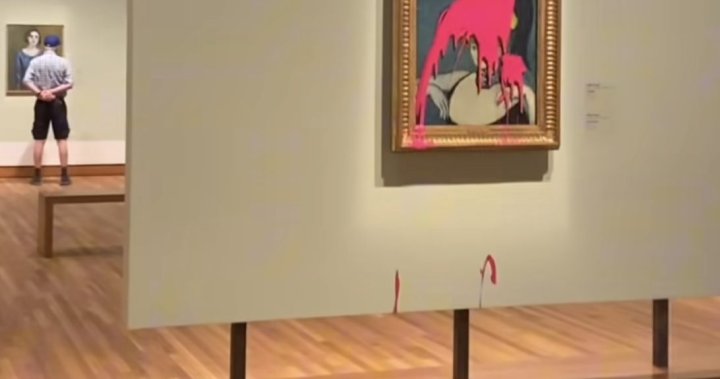Article – In what’s becoming a concerning pattern for art institutions worldwide, Montreal witnessed its own museum protest incident this week when a climate activist defaced Pablo Picasso’s “Femme au béret” at the Montreal Museum of Fine Arts. The protester, identified as 26-year-old Montrealer Elise Duval, spray-painted the protective glass covering the multi-million dollar masterpiece before security personnel intervened.
Duval, affiliated with the climate action group “Emergency Planet,” claimed responsibility for the act during her subsequent arrest. “We’re destroying our children’s future while preserving paintings behind glass,” she told reporters as police escorted her from the museum. According to witnesses, the activist managed to spray “Climate Crisis” in bright red paint across the protective barrier before museum security detained her.
The Montreal Museum of Fine Arts confirmed no permanent damage occurred to the Picasso work itself, which remains safely behind its protective glass. Museum director Marie-Claire Beaumont issued a statement emphasizing the institution’s commitment to both artistic preservation and environmental issues.
“While we understand the urgency of climate action, endangering irreplaceable cultural heritage cannot be the answer,” Beaumont said. “The museum actually hosts regular environmental forums and dedicates exhibition space to climate-focused artists. There are constructive ways to address these critical issues without putting art at risk.”
This incident follows similar protests at major galleries including London’s National Gallery, Amsterdam’s Rijksmuseum, and most recently, Paris’s Louvre. Climate activists have increasingly targeted high-profile artworks to draw attention to environmental concerns, though most groups carefully select targets protected by glass to avoid permanent damage.
Montreal police confirmed charges are pending against Duval, likely including mischief and property damage. Legal experts suggest she could face significant fines but probably not lengthy jail time, given the absence of permanent damage.
Art security specialist Jean-Michel Caron noted that museums worldwide are reassessing their security protocols in response to these incidents. “It creates a difficult balancing act,” Caron explained. “Museums want to remain accessible public spaces while protecting priceless works. Each incident like this pushes institutions toward more restrictive viewing experiences, which ultimately hurts public engagement with art.”
The targeted Picasso, valued at approximately $14 million, is currently on loan from a private European collection as part of the museum’s “Modernist Visions” exhibition. Museum officials confirmed the exhibition will continue as scheduled following a brief closure for security assessment.
Local environmental groups expressed mixed reactions. Québec Climate Coalition spokesperson Gabrielle Tremblay distanced her organization from the action while acknowledging the motivation. “We share the frustration about inadequate climate policies, but we focus on direct action against polluters, not cultural institutions,” Tremblay said.
For Montreal’s cultural community, the incident has sparked debate about protest tactics and institutional responsibility. Local artist collective Studio Climate has announced plans for an authorized performance piece outside the museum this weekend that will address environmental concerns without threatening artwork.
“Art has always been a vehicle for powerful messaging,” explained collective member Thomas Leblanc. “We believe there are ways to leverage cultural spaces for climate activism that build rather than alienate potential allies.”
Museum visitor Jeanne Martineau, who witnessed the incident, described the conflicting emotions it provoked. “It was shocking to see someone attack art that belongs to all of us, but I understand the desperation. When politicians ignore climate science year after year, people search for ways to be heard.”
The incident has reignited conversations about security in Montreal’s cultural institutions, with smaller galleries expressing concern about their vulnerability to similar protests. The Art Gallery Association of Québec has called an emergency meeting to discuss collaborative approaches to security while preserving visitor experience.
As Montreal police continue their investigation, museum officials have temporarily increased security personnel throughout the building. The Picasso exhibition is scheduled to continue through March, with the affected painting expected to remain on display once cleaning of the protective glass is complete.






